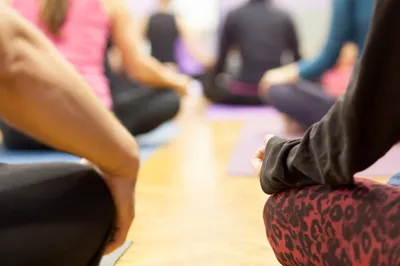Motivating yourself to consistently make healthy choices and maintain a healthy lifestyle can be difficult. Whether you get bored of your exercise regime, get tired of the same food, or thrive when challenging yourself, trying something new and healthy can give you motivation and variety that will improve your overall health. Depending on your personality and health and fitness preferences, what you try doesn’t need to be extreme—in fact, when a new year begins, many people set unrealistic health goals that they end up failing. And the impact of failure could end up making it even more difficult to get and stay motivated.
This year, reap the benefits of setting a manageable goal to challenge yourself with something new and good for your health…
1. Train For a Race
For some, marathons can seem far beyond their fitness level, but what many people don’t know is how doable it actually is. And the joy, fulfillment and self-appreciation the first time you cross that finish line will overwhelm you in the best way—it’s unlike any feeling you’ve ever experienced. For your first race, try a 5K and give yourself ample time to train. Setting small goals along the way will keep you motivated and give you a sense of accomplishment every time you get closer to the end goal, the race itself. You could also look into running groups in your area that specifically train for races.
If you already regularly enter races and marathons, challenge yourself by signing up for something more difficult. With how popular races are, your city or one close to you will offer several different kinds of races year-round, and some of these races can require a lot more than running. A race like Tough Mudder is an obstacle course that requires climbing and crawling, as well as endurance and teamwork to complete. A triathlon has swimming, running and biking, and can also be a good challenge.
2. Try a New Diet
Oh, the dreaded D-word. Diets have a bad rap, mostly because dieting often brings to mind sacrificing favorite foods, starvation (among the overly dramatic), and cutting out food groups. But not all diets are like this. Many of the best diets overall that help with weight loss and prevent and reduce the risk of serious diseases don’t completely cut out certain foods or make you give up desserts. Try a diet that will give you variety and nutrient-rich foods, and that focus on portion control and treats in moderation.
While many diets are good for your overall health, not all of them are so you need to be careful when trying a new diet. Avoid fad diets that promise drastic weight loss in little time, liquid diets that consist of a juice or powder mix for your every meal, and those that cut out several major food groups. Diets like these often result in deficiencies, and can cause health problems because your body doesn’t get the vitamins, nutrients, minerals, protein, and fiber it needs to be healthy and function properly.
3. Take a Cooking Class
There’s nothing better than trying something new and fun like a cooking class, with the added bonus of learning how to cook delicious but healthy meals. With how popular they are, you’ll likely be able to find a cooking class that’s focused on healthy eating close to you. It’s a common misconception among those who eat processed, pre-packaged foods that cooking healthy meals from scratch is difficult or not tasty. But this is far from the truth, with healthy meals and snacks just as—or even more so—easy to make and satisfying as unhealthy ones.
Sign up with a friend or your partner to spend time trying something new and having fun together. The benefits of learning how to cook healthy meals are definitely worth it, and the quality time spent with a loved one is priceless. Just make sure you sign up for a class that teaches you how to make healthy meals. The point of taking a cooking class is to challenge yourself and keep you focused on healthy eating habits.
4. Plan An Active Vacation
Vacations short and long are vital to achieving and maintaining good health. Taking a break from a busy personal and professional schedule lets you truly relax and wind down. But this year, try something new by making one of your long weekends or weeks away an active vacation. The opportunities for activity-based and adventure travel are endless, so there’s something available for everyone, including families. Some active vacations include, canoeing, kayaking, hiking by day and camping at night, rafting, cycling, mountain biking, and scuba diving. You’ll enjoy nature and get a good exercise.
If you’re the type of person who doesn’t use all of their vacation time and your employer doesn’t force you to, stop this bad habit. Any vacation could help reduce stress (by getting you away from stressful situations, like a busy work schedule), and actually make you more creative and efficient at work by taking the time needed to clear your head. It’s worth balancing your vacation time by using some of it to try a new active vacation, and the rest to do nothing but relax.
5. Make Exercising Social
Exercising regularly on your own can get kind of lonely or boring, sometimes causing you to skip a workout because you aren’t motivated. It’s easy to fall into a pattern of skipping a workout “just this once”, and before you know it, you’ve completely messed up your routine. It’s hard enough getting into a routine in the first place, and so losing that motivation can be difficult to get back. This year, challenge yourself by making at least one of your weekly workout days social, or plan active social gatherings.
Ask friends to join you at the gym, meeting your social needs by catching up and enjoying conversation as you continue your goal to stay active and healthy. Or, if you prefer exercising alone at the gym or at your home, you can add in social fitness time by planning a weekly hike, bike ride, or canoe trip (if you have access to water). You don’t always have to work out with friends, but socializing while being healthy is fun, and can keep you motivated by looking forward to seeing friends.
6. Sign Up for a New Class
Signing up for a new class is a great way to meet new people who you’ll have something in common with—exercising. Or if you have friends you exercise with regularly, it’s a good opportunity to try something new together. A lot of people are uncomfortable or nervous joining classes on their own, so doing it with someone you know can give you the confidence you need to follow through. Committing to a new class also encourages you to stick to it, whether you do so with a friend or on your own.
Since it’s important to keep your exercise regime fun and challenging, try something outside your comfort zone, like kickboxing, dance, hot yoga, bootcamp, obstacle training, rock climbing, or cross fit. Good instructors are supportive yet determined, and want to help you succeed. Many people need the encouragement or push to challenge themselves, making a class atmosphere perfect to meet these needs. Plus, there’s the added bonus that you get in some social time, especially if you’re always on the go and have a stressful schedule.
7. Learn Stress-Reducing Techniques
Something a lot of people forget to commit time to is maintaining good mental and emotional health. But neglecting these areas can greatly impact your overall health, and prevent you from being truly healthy and happy. To ensure you have a healthy mind, commit time to activities that reduce stress, clear your head, and amp up your positivity. There are several ways to do this, including yoga, meditation, and deep breathing exercises. To prevent stress from building up, make sure you schedule time to yourself to do something relaxing, like reading a book. Regularly unplug from work and social media, organize your personal and professional life, exercise, and focus on positive things in your life.
Stress and imbalance take their toll, and can eventually hurt other areas of your health—according to the Mayo Clinic, stress can cause headaches, insomnia, anxiety, poor eating habits, chest pain, muscle pain, stomach problems, and depression – the list goes on and on. So try something new this year by committing to alleviate your stress. You’ll be healthier all-around, happier, and likely more productive at work.
8. Join a Social Club or Volunteer
Another way to challenge yourself to improve your health is by starting or joining a social club, but not one that’s focused on exercise. Instead, think along the lines of a book, cooking, or movie club. Or you could tackle this aspect of being emotionally healthy by signing up to volunteer with a local organization. Emotional health is just as important as physical health, so starting or joining a club or volunteering is an effective way to ensure all-areas of your health are maintained.
Spending time with others and building personal relationships fills a need everyone has—strong friendships and positive interactions with others. It can help reduce stress by using some of your time to have fun, especially if you have a busy schedule. And in the case of volunteering, giving back to your community has a positive impact by not only fulfilling your desire to do something good, but for the people you are directly or indirectly helping. Challenge yourself to be emotionally fulfilled this year by joining a club or volunteering.
9. Add Superfoods To Your Diet
Some health experts have questioned the emergence of superfoods and their impact on your health, specifically if they actually help prevent diseases. But regardless of the controversy, there’s no denying that many superfoods help you reach daily recommended amounts of vital vitamins and nutrients that can help prevent, regulate, and reduce the risk of several cancers and diseases. Superfoods contain several healthy components, including antioxidants and a natural anti-inflammatory, and can help regulate cholesterol and blood pressure.
Even without the potential benefits to help regulate or prevent health problems, the many nutrients found in superfoods is astounding. Adding them to your diet can be fun because you’ll learn new recipes and enjoy the many rich flavors from the fruits, vegetables, herbs and spices that make the cut as superfoods. From cinnamon and turmeric to rhubarb and gogi berries, the opportunity to incorporate these foods into your diet will make for some delicious meals. Not to mention all the seeds, grains, oils, nuts, and legumes that fall into this category. And it’s easy to add superfoods to all meals and snacks.












